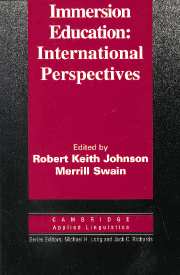Book contents
- Frontmatter
- Contents
- List of contributors
- Series editors' preface
- Preface
- Chapter 1 Immersion education: A category within bilingual education
- I IMMERSION IN A FOREIGN LANGUAGE
- II IMMERSION FOR MAJORITY-LANGUAGE STUDENTS IN A MINORITY LANGUAGE
- III IMMERSION FOR LANGUAGE REVIVAL
- IV IMMERSION FOR LANGUAGE SUPPORT
- V IMMERSION IN A LANGUAGE OF POWER
- Chapter 9 The Hong Kong education system: Late immersion under stress
- Chapter 10 Immersion in Singapore preschools
- Chapter 11 The Molteno Project: A case study of immersion for English-medium instruction in South Africa
- VI LESSONS FROM EXPERIENCE AND NEW DIRECTIONS
- Index
Chapter 11 - The Molteno Project: A case study of immersion for English-medium instruction in South Africa
Published online by Cambridge University Press: 05 October 2012
- Frontmatter
- Contents
- List of contributors
- Series editors' preface
- Preface
- Chapter 1 Immersion education: A category within bilingual education
- I IMMERSION IN A FOREIGN LANGUAGE
- II IMMERSION FOR MAJORITY-LANGUAGE STUDENTS IN A MINORITY LANGUAGE
- III IMMERSION FOR LANGUAGE REVIVAL
- IV IMMERSION FOR LANGUAGE SUPPORT
- V IMMERSION IN A LANGUAGE OF POWER
- Chapter 9 The Hong Kong education system: Late immersion under stress
- Chapter 10 Immersion in Singapore preschools
- Chapter 11 The Molteno Project: A case study of immersion for English-medium instruction in South Africa
- VI LESSONS FROM EXPERIENCE AND NEW DIRECTIONS
- Index
Summary
Introduction
South Africa is, at the time of writing in early 1995, undergoing profound change. Formally and officially, the apartheid era is over, and the political system that separated and subjugated the majority of the population in the interests of the ruling elite is being dismantled, piece by piece. This is not the place to catalogue the history of oppression, neglect, inequality and discrimination that apartheid meant for so many South Africans, but since any present or future is necessarily a product of its past, that history cannot be ignored. Everything that follows in this chapter must be set against the realities of what South Africa is and, until so recently, has been. The divided society that apartheid sought to create and maintain through “separate development” meant that the quality of every aspect of life for South Africans depended on the colour of their skins. Education has been no different. As will be seen, education for black South Africans has been poor and impoverished, its provision has been haphazard and uneven, and its relevance and quality have been inappropriate and inadequate.
It is in this context that the Molteno Project, an independent, nonprofit- making, nongovernmental organisation, has developed. It has, since 1975, been involved in the research, development and implementation of primary school language teaching and learning materials.
Like all the immersion programmes in this volume, the Molteno Project “aims to provide the quantity and quality of involvement in the use of the target language that ensures the development of a high level of proficiency” (preface).
- Type
- Chapter
- Information
- Immersion EducationInternational Perspectives, pp. 210 - 238Publisher: Cambridge University PressPrint publication year: 1997
- 4
- Cited by



